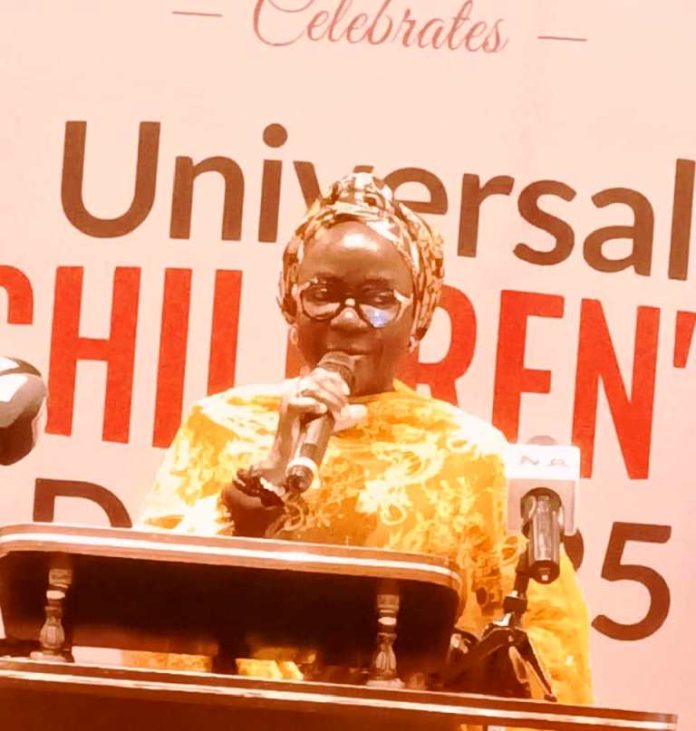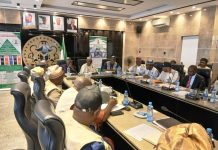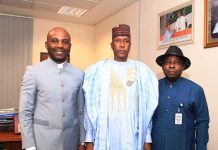
The Federal Ministry of Women Affairs and Social Development has restated its commitment to safeguarding the rights, dignity, and future of Nigerian children as it unveiled the State of the Nigerian Girl Child Report II (2025) and launched the National Guidelines on Alternative Care for Children during the 7th National Children’s Parliament sitting held at the Continental Hotel, Abuja
Delivering the keynote address on behalf of the Honourable Minister of Women Affairs and Social Development, Hajia Imaan Sulaiman-Ibrahim, fsi, the Permanent Secretary, Dr. Maryam Ismaila Keshinro, described the event as a “national call to conscience” and a decisive moment for child-rights governance in Nigeria.
“Today is not a routine occasion—it is a declaration of our collective resolve to protect, empower, and invest in every Nigerian child,” Dr. Keshinro stated.
She noted that while progress has been made in school enrollment and awareness, inequalities persist, especially in child marriage.
“Child marriage prevalence has declined from 44% to 28.6%, but this remains unacceptably high. Nigeria is home to nearly 25 million child brides—this is a national emergency that demands unified action,” she emphasized.
The Minister also condemned the recent abduction of 25 school girls in Kebbi State, calling for their immediate release.
“As a mother and a Minister, I demand their unconditional release. Our girls must never be targets of violence,” she declared, while affirming confidence in Nigeria’s security agencies.
The Minister praised the First Lady, Senator Oluremi Tinubu, CON, for championing children’s welfare through the Renewed Hope Initiative. She also lauded the Nigeria Governors’ Forum for ensuring that all 36 states have domesticated the Child Rights Act and 35 states have adopted the VAPP Act.
Traditional rulers, faith leaders, and development partners—including Save the Children, UNICEF, UN Women, IDEAS ROLAC, and Policy Innovation Center—were acknowledged for their pivotal support.
Referencing UNICEF data, the Minister cautioned that, “32% of children under five in Nigeria are malnourished, and 1.9 million children require urgent protection services due to violence, neglect, and exploitation.”
She called for intensified investments in nutrition, law enforcement, child protection, and welfare systems.
Addressing the young parliamentarians, the Minister urged them to speak boldly. Challenge norms and demand a Nigeria where every child is safe, educated, and free to dream.
The Honourable Minister highlighted major initiatives to strengthen Nigeria’s child-protection ecosystem:
1 Costed National Action Plan to End Child Marriage
A fully funded, time-bound plan aimed at reducing early marriage and keeping girls in school.
2 Nigeria’s First National Boy-Child Policy
Addressing vulnerabilities faced by boys—including school dropout, substance abuse, and exposure to violence—creating a balanced framework for gender development.
3 Updated National Child Policy (2009)
To address digital safety, mental health, climate threats, conflict, and modern child protection needs.
4 Strengthened National Menstrual Hygiene Intervention
Ensuring dignity for girls and reducing period poverty.
5.Renewed Hope Social Impact Programme
Expanding school feeding, conditional cash transfers, family-strengthening initiatives, and adolescent life-skills development.
6.National Guidelines on Alternative Care for Children
Providing a robust framework on parental care, social protection, access to education, and elimination of violence against children.
In her welcome remarks, delivered by the Director of Child Development, Mr. Andrew Ali Madugu, the Permanent Secretary reiterated that the day’s commemoration aligns with the global theme, “My Day, My Rights.”
“We do not just gather in a hall; we converge in a chamber of democracy. Here, our children are not leaders of tomorrow—they are legislators of today,” she affirmed.
She charged members of the Children’s Parliament to debate boldly and urged policymakers to translate the resolutions into actionable policies and budgetary priorities.
Hon. Edema Iron, Commissioner for Women Affairs, Cross River State, emphasized parental responsibility:
“Children are not just to be seen but heard. We must listen with love so they feel valued, protected, and safe from harm.”
Mr. Duncan Harvey, Country Director of Save the Children International, applauded Nigeria’s progress but warned of persisting challenges.
“The drop in child marriage from 44% to 28.6% is significant, but millions of girls remain at risk. In states like Katsina (82.19%) and Gombe (77.8%), the crisis persists, driven by poverty and conflict.”
He called for education, empowerment, and stronger law enforcement to end child marriage.
Ms. Mona Aika, UNICEF Child Protection Manager, reaffirmed UNICEF’s commitment:, saying “children’s rights are human rights. Today is their day, their rights, and our shared responsibility. When we listen and act, every Nigerian child can thrive.”
The Deputy Director of Child Development, Mr. Musa Aliyu Musa, delivered the vote of thanks, appreciating all dignitaries, partners, media, and children for making the event a milestone in Nigeria’s journey toward a safer and more inclusive society for every child.
The 2025 Universal Day of the Child celebration and the 7th National Children’s Parliament reaffirmed Nigeria’s resolve to build a nation where no child is left behind—where every child is protected, educated, and empowered to achieve their full potential.
“When our children thrive, Nigeria rises.”, she said
Signed
Ahmed Lawan Danbazau mnipr
Head, Press and Public Relations Department





